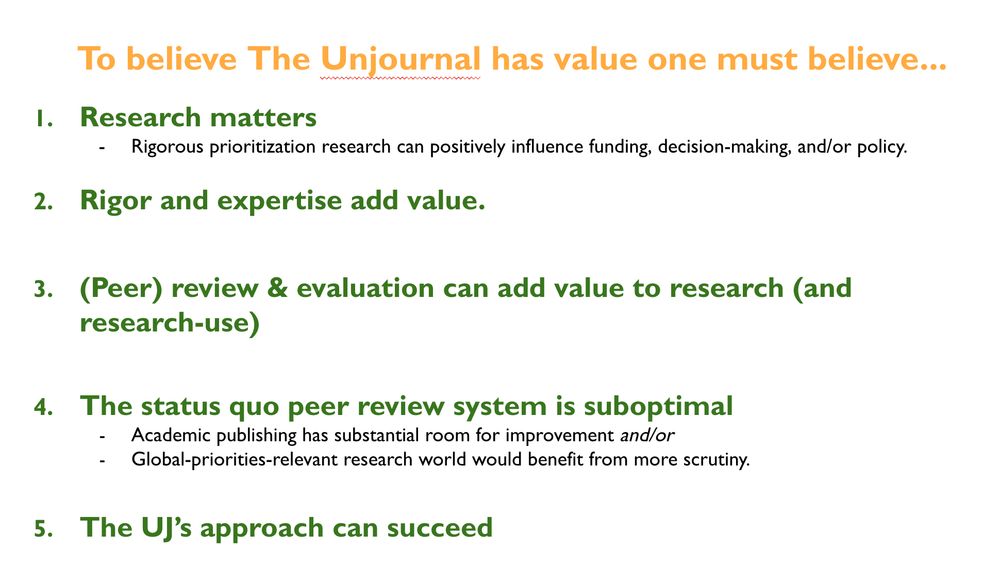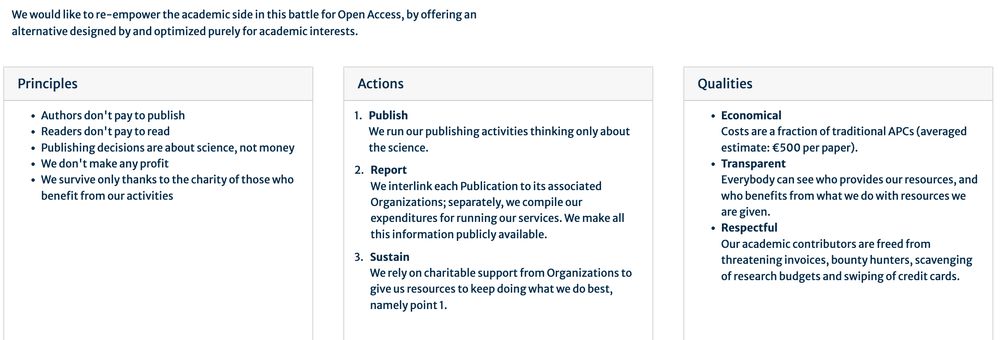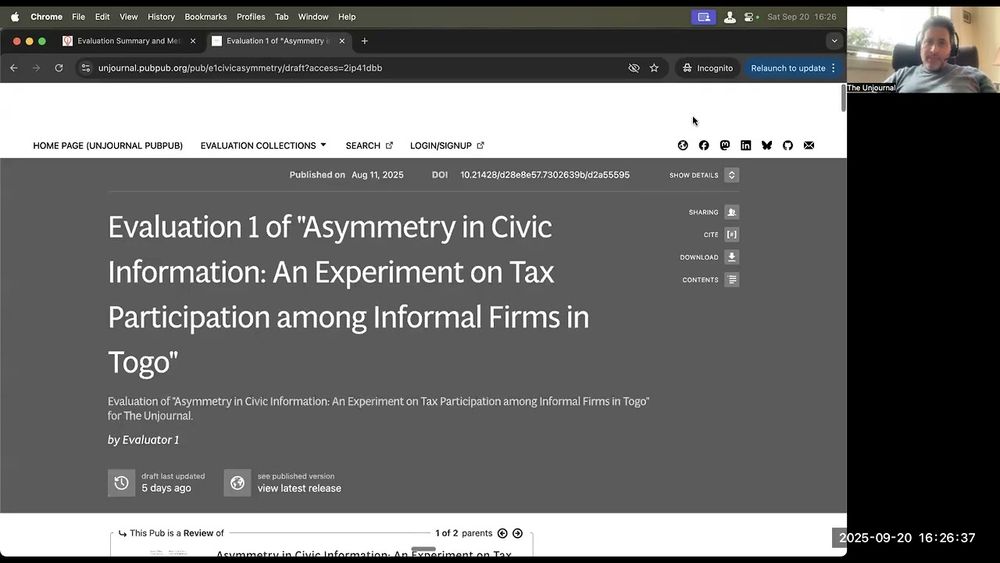
1. Prioritize research in terms of its potential for impact (see coda.io/d/Public-Dat...)
2. Commission public, expert, evaluations of this research, asking for reports & ratings across several criteria, including Relevance/Usefulness

1. Prioritize research in terms of its potential for impact (see coda.io/d/Public-Dat...)
2. Commission public, expert, evaluations of this research, asking for reports & ratings across several criteria, including Relevance/Usefulness

Unjournal.org wants your feedback on our work & how we can improve & boost our impact.
Survey with lottery incentive: See
Unjournal.org wants your feedback on our work & how we can improve & boost our impact.
Survey with lottery incentive: See
Don celebrated our normalization of pre-registration and #openAccess data, materials, etc. 🙌
But he reminded us of how...
Takeaways:
- P-curves aren't sufficient
- Share EVERYTHING (including #Qualtrics files)
- Describe findings AS OPERATIONALIZED
- Loads of #JDM is good! (cf. headlines)
- Keep speaking up!




Don celebrated our normalization of pre-registration and #openAccess data, materials, etc. 🙌
But he reminded us of how...
He then pointed us to better publication practices:
- @peercommunityin.bsky.social
- @unjournal.bsky.social
- @metaror.bsky.social
Post credits: @alexh.bsky.social, @jwastrachan.bsky.social



He then pointed us to better publication practices:
- @peercommunityin.bsky.social
- @unjournal.bsky.social
- @metaror.bsky.social
Post credits: @alexh.bsky.social, @jwastrachan.bsky.social
See

See
There is the @unjournal.bsky.social. There is Peer Community In @peercommunityin.bsky.social. There are dozens of newly-founded diamond OA (free to read, free to publish) journals being born, eg Experimental Philosophy @xphilosopher.bsky.social.
There is the @unjournal.bsky.social. There is Peer Community In @peercommunityin.bsky.social. There are dozens of newly-founded diamond OA (free to read, free to publish) journals being born, eg Experimental Philosophy @xphilosopher.bsky.social.
https://bit.ly/49lWRVJ (Consider pledging?)
Plans:
- Integrate some Unjournal’s Pivotal Question content (cultured meat, plant-based alternatives)
- Help operationalize & vet tournament questions
https://bit.ly/49lWRVJ (Consider pledging?)
Plans:
- Integrate some Unjournal’s Pivotal Question content (cultured meat, plant-based alternatives)
- Help operationalize & vet tournament questions
(Scatterplot: imputed data from 40 quantifiable responses, not including applied stream nor those who used the PubPub form.)

(Scatterplot: imputed data from 40 quantifiable responses, not including applied stream nor those who used the PubPub form.)
Recently commended work by 3 David's (Reiley, Hugh-Jones, & Manheim), Estere Seinkmane, Eleanor Tsai, & 2 anonymous heroes.

Recently commended work by 3 David's (Reiley, Hugh-Jones, & Manheim), Estere Seinkmane, Eleanor Tsai, & 2 anonymous heroes.
We want your feedback on the experience, the quality of the evaluations, and how this impacted your work.
https://bit.ly/4qKtYIZ
1/10 get a $100 prize.

We want your feedback on the experience, the quality of the evaluations, and how this impacted your work.
https://bit.ly/4qKtYIZ
1/10 get a $100 prize.
- Help w/ editorial triage, review quality, & turnaround
- Support transparency, open-access.
Details: https://bit.ly/3JEee9J
Feedback & questions welcome!

- Help w/ editorial triage, review quality, & turnaround
- Support transparency, open-access.
Details: https://bit.ly/3JEee9J
Feedback & questions welcome!
opusproject.eu/openscience-...
(Maybe $50 million per year in APCs for physics and astronomy the most active areas for SciPost)
opusproject.eu/openscience-...
(Maybe $50 million per year in APCs for physics and astronomy the most active areas for SciPost)
Top 'citers of unjournal-evaluated research': https://bit.ly/3WRHc8W include Esther Duflo, Julian Jamison, & Berk Özler


Top 'citers of unjournal-evaluated research': https://bit.ly/3WRHc8W include Esther Duflo, Julian Jamison, & Berk Özler
And, you guessed it: This is a blatant promo for one of our first & strongest evaluation packages, of "Artificial Intelligence & Economic Growth” by Aghion et al.

And, you guessed it: This is a blatant promo for one of our first & strongest evaluation packages, of "Artificial Intelligence & Economic Growth” by Aghion et al.

https://bit.ly/3J1iMqk
BenYishay et al '24: River-based irrigation boosted #agricultural output & child #nutrition & reduced conflict in supported communities, but had negative spillovers on surrounding areas.
--->



https://bit.ly/3J1iMqk
BenYishay et al '24: River-based irrigation boosted #agricultural output & child #nutrition & reduced conflict in supported communities, but had negative spillovers on surrounding areas.
--->
https://bit.ly/3J1iMqk
BenYishay et al '24: River-based irrigation boosted #agricultural output & child #nutrition & reduced conflict in supported communities, but had negative spillovers on surrounding areas.
--->



https://bit.ly/3J1iMqk
BenYishay et al '24: River-based irrigation boosted #agricultural output & child #nutrition & reduced conflict in supported communities, but had negative spillovers on surrounding areas.
--->

Much agrees w/ Unjournal.org practices.
Some differences (Us/Them)
1. Quant. ratings vs accept/reject
2. Publish all evaluations vs. only if ‘accepted’
3. Fields & applied focus
4. We pay evaluators
5. We don’t 'publish' papers, just evaluations


Much agrees w/ Unjournal.org practices.
Some differences (Us/Them)
1. Quant. ratings vs accept/reject
2. Publish all evaluations vs. only if ‘accepted’
3. Fields & applied focus
4. We pay evaluators
5. We don’t 'publish' papers, just evaluations




